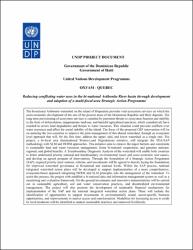/admin/item?itemID=034191ce-6955-4fb6-8175-845daf003c65
Reducing conflicting water uses in the bi-national Artibonite River basin through development and adoption of a multi-focal area strategic action programme

Ver/
Tipo de acceso
AbiertoTipo de Material
TextoIdioma
InglésAudiencia
Técnicos, profesionales y científicosColección
- Gestión ambiental [2956]
Metadatos
Mostrar el registro completo del ítem| Sinopsis: | The bi-national Artibonite watershed on the island of Hispaniola provides vital ecosystem services on which the socio-economic development of the one of the poorest areas of the Dominican Republic and Haiti depends. The long-term provisioning of ecosystem services is curtailed by persistent threats to ecosystem function and stability in the form of deforestation, inappropriate land-use, and harmful agricultural practices, which cumulatively have resulted in severe land degradation and threats to water resources. This situation could provoke conflicts over water resources and affect the social stability of the island. The focus of the proposed GEF intervention will be on assisting the two countries to improve the joint management of this shared watershed, through an ecosystem level approach that will, for the first time, address the upper, mid, and lower watershed as a single unit. |
| Autor(es): | Government of the Dominican Republic
Government of Haiti |
| Año: | 2011 |
| Publicado: | United Nations Development Programme (UNDP); Oxfam-Quebec |
| Citación: | Government of the Dominican Republic and Government of Haiti (2011). Reducing conflicting water uses in the bi-national Artibonite River basin through development and adoption of a multi-focal area strategic action programme. United Nations Development Programme (UNDP); Oxfam-Quebec. Recuperado de: |
| URI: | https://bvearmb.do/handle/123456789/3143
|

